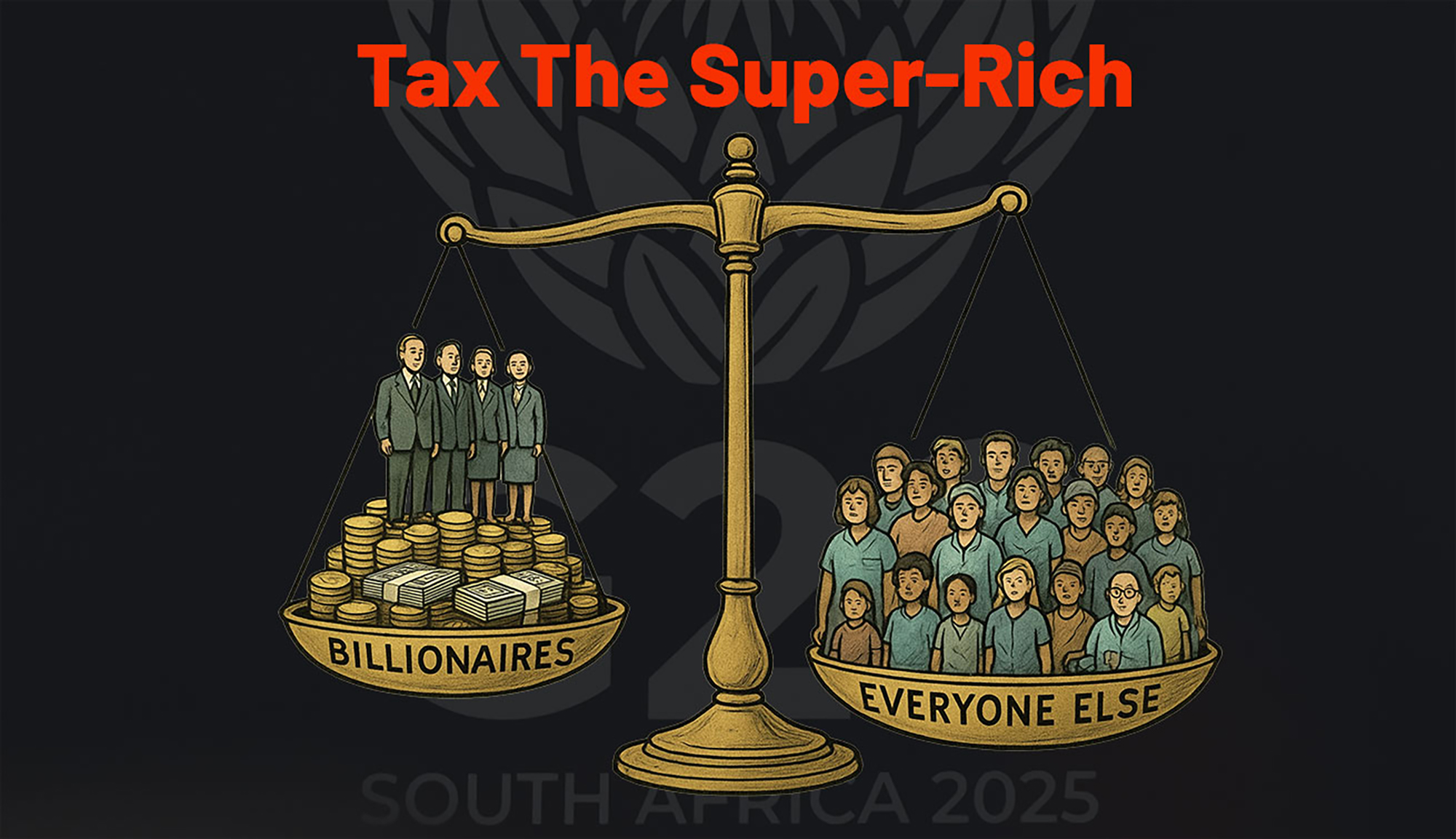/file/dailymaverick/wp-content/uploads/2025/10/label-Op-Ed.jpg)
When the leaders of the G20 gathered in Brazil in late November 2024, they opened the G20 summit with a commitment: to build a just and sustainable world where no one is left behind. One year on, as leaders meet in South Africa, this sentiment is off the table.
With geopolitical headwinds swirling and the very real possibility of a summit without a Leader’s Declaration, it would be easy for governments to retreat. But this is not a moment for retreat. It is a moment to stand firm, to invest in progressive coalitions and to champion bold ideas like taxing the super-rich to fight one of the defining challenges of our time: inequality.
This G20 must be another step in that direction before the torch passes to the US — and the challenges this may bring for inequality internationally — in 2026. Now is a good time to take stock of this year. The early months may have brought disenchantment, but in retrospective, 2025 showed us that even in the darkest moments hope has a way of breaking through. Political will, when summoned, still can offer solutions to the world’s most pressing issues.
This year also exposed the devastating breakdown of the global order built after World War 2. Norms and rules designed to protect people — to prevent atrocities — have been repeatedly violated and ignored, with repeated assaults on international humanitarian law. The genocide in Gaza, the conflict in the Democratic Republic of Congo and the atrocities in Sudan. All of these have not only come at a human cost, but have also exposed the hypocrisy, complicity, self-interest and double standards of powerful countries. Behind the headlines families are torn apart, communities displaced and futures erased — while those with influence choose, far too often, to look the other way.
The planet itself is on a similar unjust trajectory. The climate crisis is deepening. The green transition is being shaped by the world’s richest countries, often in the Global North. This is despite the fact that 70% of minerals needed for the transition lie in the Global South. On top of that, countries in the Global North continue to hammer out arguments of “geopolitical competition” and “national interests” to justify their ever-shrinking climate finance budgets.
Biggest aid cuts in history
The world of aid has fared no better. G7 countries are poised to implement the biggest aid cuts in history — cuts deeper than anything recorded since the 1960s. The consequences are not abstract. They will be measured in the millions of lives lost, empty classrooms, clinics without medicines and meals that never reach those who need them.
Debt — a central issue at this G20 — is also spiralling. Sixty percent of the poorest countries in the world are at risk of default. Many indebted countries now pay more to private creditors than they receive. It is a vicious cycle that traps them instead of helping them build a future.
Meanwhile, the space for people to demand their rights is shrinking. Only 40 countries worldwide now enjoy open civic space — that is, one in five countries. This is not an accident. It is a deliberate slide towards concentration of power and oligarchies and away from democratic accountability.
All these crises stem from the same source: a global economy defined by extreme inequality. Last year, billionaires in G20 countries saw their wealth soar enough to lift the 3.8 billion people living in poverty, out of it. Inequality is not inevitable. It is a policy choice.
But even in these dark times, there are sparks of hope. We see young people taking to the streets, demanding an end to a system that breeds inequality, corruption and collapsing basic public services. Their voices echo deeper calls for accountability and dignity.
Nowhere is this more evident than in the global outpouring of solidarity with Palestine. These voices insisting on a process rooted in truth and justice, with Palestinians to the fore in shaping their future, remind us that meaningful change begins when ordinary people refuse to accept the status quo, and that change means redesigning systems and restoring humanity at the heart of global governance.
Another spark of hope came from the Financing for Development Conference in Spain, where all countries, bar one, agreed the Compromiso de Sevilla. It was not perfect, but it raised the bar for negotiations in the years to come, on inequality, care, debt, progressive tax policies and included a push beyond GDP as the single measure of progress.
New coalitions
What was even more promising was the emergence of new coalitions between governments, academia, international organisations and civil society working together to fast-track taxing the super-rich and investing in the care economy.
Under South Africa’s G20 Presidency, we have just witnessed another important step with the landmark inequality report led by Nobel laureate and renowned economist, Joseph Stiglitz. The call for an International Panel on Inequality is clear and practical. G20 governments must put their support behind this initiative and send a political signal that the inequality emergency is real.
As G20 leaders meet on South African soil, they face a “simple” choice. They can govern for the people or for billionaires. They must carry the mantel of the Brazil G20 and make a real plan to tax the super-rich. They must choose justice over wealth. DM
Amitabh Behar is executive director of Oxfam International.




 Illustrative image | G20 A more equal world Is within reach If leaders choose It. (Photo: (Photo: Gallo Images / Darren Stewart | AI generated)
Illustrative image | G20 A more equal world Is within reach If leaders choose It. (Photo: (Photo: Gallo Images / Darren Stewart | AI generated)